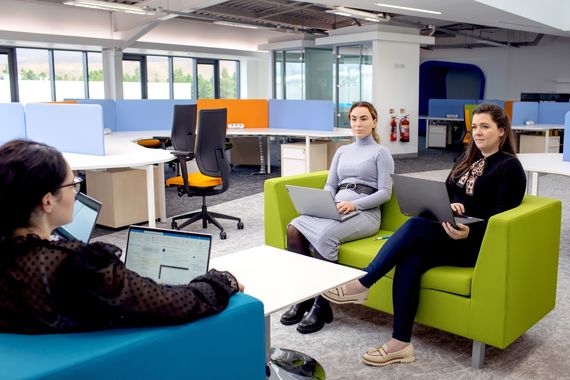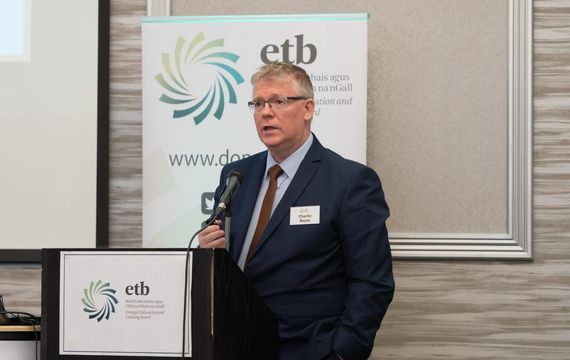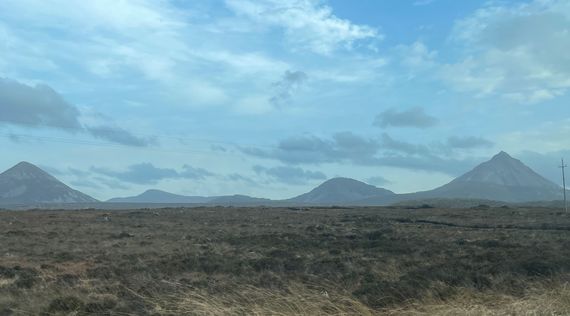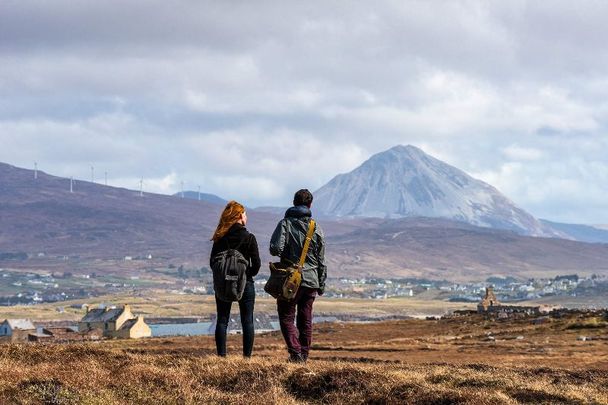If you could work anywhere in the world, wouldn't you rather work somewhere that boasts a great standard of living to match the great scenery?
This St. Patrick's Day, I want to tell you a small but life-changing story about what just happened to me in the place where I thought I'd never see it – Co Donegal, my home county.
To begin with, I took the 45-minute flight from Dublin to the airport that's been voted the most scenic in the world, Carrickfinn (Aerfort Dhún na nGall) located in the shadow of the majestic Errigal mountain and just about 15 minutes outside of Dungloe and Gweedore.
Hello Donegal. I’m very glad to be back. ❤️ pic.twitter.com/xzAm7xcAn3
— Cahir O’Doherty (@randomirish) February 14, 2023
West Donegal is Gaeltacht heartland, where Irish language-speaking communities proliferate, but now it's also a growing tech hub, where people fleeing the exploding Dublin rental market – or in search of a better place to invest their time and money – are suddenly flocking.
They are returning - or in many cases moving into Donegal for the first time – because increasingly the internet has allowed professionals to work remotely from literally anywhere in the world via a lightening fast broadband connection.
If you could work anywhere in the world wouldn't you prefer to be a part of a supportive local community, featuring well-run schools, good public transport, creche facilities, and an open economy that rewards innovation and values the social cohesion that comes from investment in people as well as in corporations?

Located in Gweedore, County Donegal, gTeic is a tech hub that connects the county to the world.
Things have clearly changed in Donegal and the questions facing emigrants are no longer the same. There are better options on the table now. In Gweedore, for example, Údarás na Gaeltachta (the regional authority responsible for the economic, social, and cultural development of the Gaeltacht) has expanded the stunning Gaoth Dobhair gTeic Business Hub to respond to the rapidly evolving business culture on the ground.
Envisioned to provide essential services to companies, entrepreneurs, remote workers, community groups, and visitors, gTeic is a stylish, beautifully planned tech hub that has been busy attracting experienced emigrant talent back to their home county and boosting employment in the region in the process.
With its remote working hubs, broadband internet, impressively run digital infrastructure, and commitment to the national language - as well as to equality and social inclusion - gTeic Gaoth Dobhair is one of the many new county-wide hubs that are busy making the Donegal one of the most attractive remote working locations in the world.
“When people leave here to go to university, the challenge is to facilitate new ways that they can come back and work from here,” Aodh Mac Suibhne of Údarás na Gaeltachta tells IrishCentral.
“gTeic shows them it's possible to do that now. When people go away to university from here there is the very real prospect that at least some of them can return.”
So Donegal, the county that was once a byword for geographic isolation and governmental neglect has become an unexpected new global hub, with high-speed broadband bringing the world to its doorstep via the magic of the internet. Talk about changing times.
“At gTeic, the Irish language is our primary concern, but you won't have it without jobs," Mac Suibhn explains. "So we're here to look after the language and create employment at the same time and the two of those ambitions are intertwined with our growth, there's no doubt about that."
Charlie Boyle, the CEO of Customer Service Ireland, agrees and points to the unique way that commerce and community are intertwined here. “It takes me less than 15 minutes to get to work here through stunning scenery, but I love that the facilities at gTeic are on par with anything you'd see in New York, London, or Dublin. But the fact is it's here, on the Wild Atlantic Way, in the heart of my community.”
'Up here, it's different,' they like to say, in reference to the living link to the Irish language, but also to the values and traditions of the place, which the locals rightly feel are special and worth promoting and protecting, making the place unique even within Ireland itself.
Taken together – the unique marriage of tradition and modernity - and you have the genesis of a new way forward for the entire county, both culturally and economically, built on the sturdiest of foundations.

Charlie Boyle, the CEO of Customer Service Ireland, has offices at gTeic in Gweedore.
But if quality of life is what we're after these days, especially post-lockdown when our priorities received an unforgettable reality check, what about the income to make all these aspirations possible?
In Donegal, it's often been a choice between one or the other, but now something truly exciting is happening there that could change the game for all comers, perhaps forever.
Now you can combine your expertise, your access to the global marketplace, and your preferred home base under one roof. What was once a faraway dream has become a reality and we are only slowly catching on to the economic implications.
When third-level education in the county exploded from the 1980s onwards, many left for college, seeking better-paid alternatives to factory jobs in the local community. Only now are these out-of-county and country workers finally able to contemplate returning home for the first time.
The prospect of combining professional skills with a return home can be a heady experience, as I discovered myself. In Donegal, on my second night home, I participated in a series of public readings that assembled some of the best-known writers and creatives in the county. Almost all of them were LGBT.
Some were famous actors on TG4, the national Irish language station, others designed sets or costumes for film industry hits like "Game Of Thrones," some were renowned poets like Cathal Ó Searcaigh or historians like Brian Lacey, and all of them lived and worked within a few miles of the venue in Donegal.
It would have been science fiction to me growing up in Donegal in the 1980s to imagine a time when I could be surrounded by a room full of distinguished LGBT creatives in my home county – many of whom are also members of a local hill walking group and a re-wilding organization that provide ample opportunities to connect and share experiences, friendship and community support.
I have never been in a room anywhere, never mind in my home county, with so many talented and accomplished LGBT people, but here they were all living within fifteen minutes of Falcarragh where we gathered on the night.
If anything has ever made me contemplate a return to live in Donegal, a gathering like this, facilitated by the changed atmosphere and attitudes on the ground, would. I am still not over the delight of realizing, for the first time, that my community and county are making room and offering a welcome to all its family members.
My teenage self would never have believed this. So proud of my home town - and thinking of the ones who will be carried in our hearts today. ? https://t.co/mkvB4fBGo2
— Cahir O’Doherty (@randomirish) June 5, 2022
In the Gaeltacht, the arts are baked into the everyday life of the community in a way that is quite unique, there is no real division or distinction made, and one doesn't exist without reference to the others.
At gTeic, I met the legendary musician Mairéad Ní Mhaonaigh, fiddler and lead vocalist of Altan, who pops into the center, as many creatives here do, to make use of the blazingly fast broadband when doing research or planning tours.
Not just a musician but a learned scholar of the local traditions, Ní Mhaonaigh grew up surrounded by artists (her father wrote plays and she quickly learned to play music herself) before becoming one herself.
“I've seen a change in how the younger people are thinking about their futures here,” she tells IrishCentral. “Places like this are offering them opportunities that were not here before and I like to pop in myself to connect with the wider world.”
If you're going to be in Gaoth Dobhair, Donegal, and you're interested in music, you should check out the session at @LoistinB on Mondays & Fridays.
— Derek Hollingsworth (@DerekHolly7) August 9, 2022
Beidh ceol, caint agus craic ann.#AnGhaeltacht #trad pic.twitter.com/v3jhU9h7Hf
Underlining how the local arts sector is flourishing county-wide, I also met with arts organizations like the Glebe House & Gallery (former home of the renowned artist Derek Hill) which are busy welcoming visitors, showing emerging artists, greeting bus loads of school students and inspiring the next generation of practitioners year round.
At the Amharclann Ghaoth Dobhair, the only Irish language theatre in the country that is situated in the heart of the Gaeltacht in Gweedore, I met with Adrian Kelly, Curator of the Glebe Gallery, who talk about a successful exhibition featuring three young local artists who's careers are taking off.
“Myrid Carten, Cliodhna Timoney, and Áine McBride (who uses They/Them pronouns) are all about the same age in their early 30's,” Kelly tells IrishCentral. “And we had a really good exhibition of their work recently. Loads of people really hated it and I was saying at the time, you shouldn't hate it that much, it's clearly doing something to you!”
This summer, Glebe House will exhibit the works of many women artists. “Our collection is unusual because it has a lot of women in it,” Kelly explains. “Derek Hill, the collection's founder, collected the work of a lot of women artists and so we are going to pull them all out.”
Thanks Jean, we had a very informative tour of The Glebe House and Gallery this evening @opwireland pic.twitter.com/tcmE6DeHiS
— Visit Donegal (@visit_donegal) August 15, 2017
Also at the Amharclann Ghaoth Dobhair discussion was Danielle Nic Pháidín, who works as a facilitator with Ealaín na Gaeltachta, which supports the arts in Irish-speaking districts. Her guidance helps artists and venues in the local community to widen local access and participation in the arts.
“Our main objective is to provide the funding as well as support to help the theaters, and galleries and to support different arts projects. The brief is fairly wide in terms of Irish-speaking arts and initiatives and projects.”
Later I toured the 300-seater Amharclann Ghaoth Dobhair itself, the beating heart of the wider Gaeltacht community, providing a forum for plays, musicians, public talks, and concerts.

Errigal and the ancient landscape of West Donegal
Historian Breandán Mac Suibhne, who went to grad school at Carnegie Mellon in Pittsburgh and who now oversees the University of Galway's Acadamh (Academy) which has a study centre in Gweedore, laid it out for me: “I am biased, I was born here, but I can't think of a better base for US study abroad programs anywhere in Ireland than west Donegal.
“We have a stunning natural environment, with great transport links to Dublin. And from learning Irish to exploring the places that inspired the great plays of Brian Friel and Frank McGuinness to visiting our regional capital, Derry, and working to understand everything from the monastic culture of the medieval period to the 17th-century plantation of Ulster to the politics of Ireland's late 20th-century Troubles and peace process - students get it all, whether they come for a short stay or a semester-long visit. It's all here.”
Anna Ní Bhroin, who works on International programming for the University of Galway, agrees: “It is a win-win. The academic, business, and cultural sectors—that A, B, C—are all working together here. The relationships built today in one sector will stand to us tomorrow in another.”
It's hard to miss the renewed energy at work in this diverse, progressive, and ambitious Irish language community and county. There is good reason for it, too. Irish fluency has become a cool aspiration for the young in a way that turns the attitude of previous generations on their head.
Nowhere is this change of direction more evident than in Irish language film production, which just made history with an Oscar nomination for "The Quiet Girl" ("An Cailín Ciúin.")
'You're graaaand' @jamieleecurtis shares her love for Ireland on the #BAFTAs red carpet. Plus Barry Keoghan and Paul Mescal are overjoyed for the Irish film industry | Read more: https://t.co/e0JuSql4Cz pic.twitter.com/l5pHeSQJws
— Entertainment on RTÉ (@RTE_Ents) February 20, 2023
Deirbhile Ní Churraighín, the Commissioning and Acquisitions Executive at TG4 who was in Hollywood for the Oscars this weekend, told IrishCentral: “Whatever happens on the night, we've already won. The impact that 'An Cailín Ciúin' has made internationally is an unbelievable thing for the Irish language. And it's just it's such a special film.
"At TG4, Alan Esslemont, the Director General, believed that we needed to find a way to make feature films. So we talked to Fís Éireann/Screen Ireland and once they were on board, he talked to the Broadcasting Authority of Ireland. And that created the magic triangle of three Irish funders.
“Another historical thing that people are not talking about is the fact that this film was completely made in Ireland, by an Irish-speaking writer, director, producer, an Irish-speaking cast and crew and it was completely funded in Ireland. So it just goes to show what can be done when people come together and say, 'Okay, we're going to do this.'
Why I hope "The Quiet Girl" wins an Oscar
In "The Quiet Girl," Colm Bairéad has done something that I have rarely seen in Irish films - he saves us from pastiche, from becoming caricatures of ourselves. https://t.co/h9CUZGV3Rm
— Cahir O’Doherty (@randomirish) January 21, 2023
All along the Wild Atlantic Way, from Connemara through the University of Galway to the Gaeltacht to Letterkenny and Inishowen, a network of activists, academics, Irish language speakers and online entrepreneurs are coming together to build a new route to a mutually rewarding future and it's working.
Growing up in Donegal herself, Ní Churraighín doesn't sugarcoat how dramatically social attitudes have changed within her own lifetime. “I think a new atmosphere has been created by and for the LGBT community there now. I mean, they're safe now. And as you well know, there was a time when they were not safe.”
She continues: “I think the marriage referendum opened a lot of people's eyes. I mean people were coming home to vote to make sure the change happened. So I think now it's about quality of life for all in Donegal. It's about getting back to the mothership, being with the neighbors, collaborating on arts projects, whether it's sculpture or painting or song or instruments or filmmaking or theater-making. The space is there now for people to be fully themselves.”
Why should you return now, after all these years abroad, you may ask yourself? For me, the answer isn't found in all the dramatic contrasts between the past and the present.
I found it in the effort a young worker in a local supermarket took to make sure I found the place where the coffee was stored, then the sandwiches, then the wooden spoons to make sure I could give it a good stir. She happily led me from pillar to post, asking where I'd come from, talking about the weather that morning and even discussing the breaking news headlines.
Picture the last time that happened to you in America or Australia or Canada or the UK? It was just another Wednesday morning in Donegal. Her cheerfulness was infectious. Her kindness spoke for her community and upbringing.
In the past growing up in Donegal, you eventually have to make a life-altering decision: stay or go? There have been many Irish dramas written about this classic emigrant's decision.
But does it have to be this way still? Can't there be a happier outcome to this age-old story between those who leave and those who stay? Are we still fated to endure this halting and haunted leaving and staying dance?
Or can we do better for ourselves now, for our loved ones, and for the people who will be coming after us? In Donegal, the answer – the maths – and the opportunities are dramatically expanding and it's time we recognized it.
The age-old game of emigrant musical chairs may be finally coming to an end. To find out how you can make the move – or the return – click HERE.




Comments